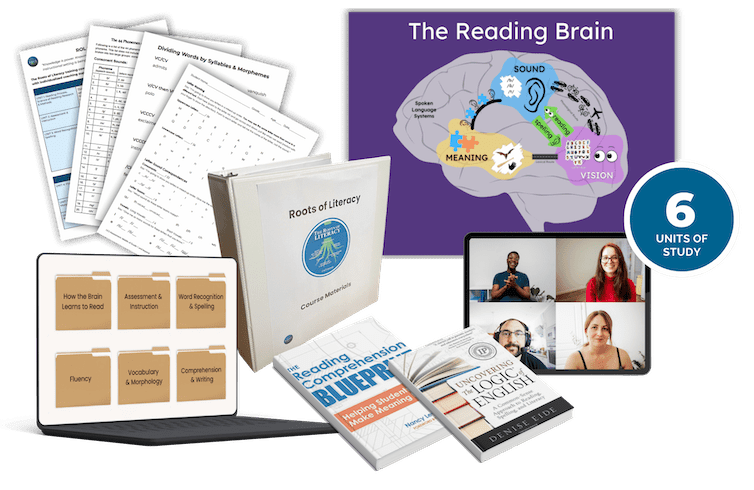An Introduction to the Science of Reading
Roots of Literacy
Introductory training in the science of reading for educators at all levels. The small group instruction incorporates practice and role play to build foundational knowledge of evidence-based literacy.
Your students are struggling. And so are you.
You’ve heard about the science of reading, but you don’t know where to get high-quality instruction.
Meanwhile, you see your students slipping further and further behind and you don’t know why or how to help them.
You’re trying everything, but nothing is working.
Where can you turn?
2025 DATES
9 am - 3 pm, EST
Section 1: July 21, 22, 23, 28, 29, 30
Section 2 is currently enrolled and will take place on July 7, 8, 9, 14, 15, & 16.
Those taking Section 1 in 2025 will enroll in Section 2 in 2026.

Your first step:
Enroll in the Roots of Literacy training.
Roots of Literacy introduces the fundamentals of the science of reading and Structured Literacy for educators at all levels.
It contains two sections:
Section 1
The Science Of How The Brain Learns To Read
Assessment And Instruction
Word Recognition And Spelling
Section 2
Fluency
Vocabulary And Morphology
Comprehension And Writing
GROW
MOTIVATED READERS
UNLOCK
STUDENT LEARNING
REGAIN
YOUR CONFIDENCE
Small group instruction held every summer
The training consists of 6 sessions during the summer.
Participants are enrolled in cohorts of up to 20 educators from any school in the U.S.
Learn from the comfort of your own home.
No time away or travel expenses required!
Taught by current educators, for educators
Each cohort is led by a current teacher who currently works in a school, bringing empathy and understanding to their approach. As teachers trained in the science of reading, they also can share their own literacy transformation and experiences with you.
Using practice and modeling, they help you troubleshoot and overcome obstacles so you can finally find success with your students. All instructional approaches and tools are evidence-based and classroom-tested, so you know they work.

Roots of Literacy is ideal for educators at any level
If you are an educator at any level looking for an entry point to learn about the science of reading, the Roots of Literacy is the place to start.
Typical participants are practitioners (i.e., educators who work directly with students) and coaches (educators who support practitioners).
2025 DATES
Section 1: July 21, 22, 23, 28, 29, 30
9 am - 3 pm, EST
Investment
Each Section of Roots of Literacy training is $700 per person
Testimonials
Satisfaction Guaranteed.
We’re invested in your success.
If you aren’t 100% satisfied within 3 days of our training, we’ll refund your full payment.
More questions about the Roots of Literacy?
-
This virtual training is the essential first step for Practitioners and Coaches who wish to gain foundational knowledge about the science of reading and Structured Literacy.
-
The training is broken down into two Sections as follows. Multiple cohorts are offered per year as follows:
Section 1: 6 days, 9am-3pm EST
Section 2: 5 days, 9am-3pm EST
-
The Roots of Literacy, Section 1 training covers the Word Recognition strands of Scarborough’s Rope:
The Science of the Reading Brain: Understand historical and current approaches to literacy instruction, the science of how the brain learns to read, & neurological learning differences including dyslexia and developmental language disorder.
Assessment & Instruction: The 4 types of assessment, evidence-based practices & approaches including Structured Literacy, cognitive strategy instruction & the gradual release model, how to assess & build students’ metacognition, & lesson structure.
Word Recognition & Spelling: Phonological awareness, the 44 phonemes of the English language, letter formation, phonics, decoding, encoding, teaching high frequency irregular words, & more.
-
Roots of Literacy, Section 2 Training covers the Language Comprehension strands of Scarborough’s Rope:
Fluency: Learn why fluency is the bridge from word recognition to comprehension, how to build fluent readers, & how to motivate students to read.
Vocabulary & Morphology: Learn how to assess and instruct the 3 tiers of vocabulary, how to expand students’ vocabulary through morphology, explicit & implicit instructional practices, & cognitive strategies.
Comprehension & Writing: Learn about syntax, text types, and how to create and deliver pre-, during-, post- cognitive strategies to develop deep comprehension.
-
Yes, RLD’s Roots of Literacy training is approved by the RI Department of Education. Educators who complete the training receive RIDE’s Literacy/Dyslexia Endorsement.









